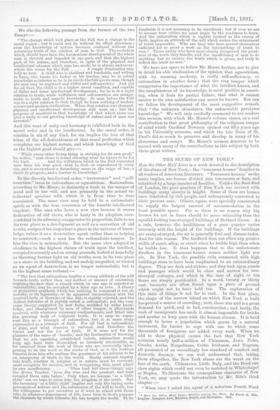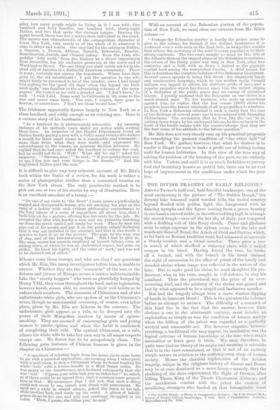• THE SLUMS OF NEW YORK.*
How the Other Half Lives is a work devoted to the description of the slums of New York,—the " tenement-houses " familiar to all readers of American literature. "Tenement-houses," as the name implies, are houses divided into tenements or flats, and inhabited by a large number of families. Unlike the East End of London, the poor quarters of New York are covered with buildings many storeys in height. Some of them are houses once inhabited by rich people, and subsequently converted to their present uses. Others, again, were specially constructed to supply the largest amount of accommodation in the least possible space. Per se there is no reason why big houses let out in floors should be more unhealthy than the squalid-looking two-storeyed buildings of Bethnal Green. As a rule, however, the healthiness of a poor quarter varies inversely with the height of the buildings. If the buildings are many-storeyed, the air is generally foul and disease-laden. And for this reason. The landlord does not allow any greater width of court, alley, or street when he builds high than when he builds low. It thus happens that to the unfortunate dwellers in the tenement-houses comes neither light nor air. In New York, the possible evils connected with high buildings seem to have been emphasised to an extraordinary degree. They are dark and airless ; and they look upon courts and passages which would be close and narrow for two- storeyed cottages, and which in the case of eight or ten floors are simply pestilential. In a word, twenty or thirty vast barracks are often found upon a piece of ground which ought not to have held ten. The explanation of this state of things is not far to seek. In the first place, the shape of the narrow island on which New York is built has proved a source of crowding ; next, there was and is a great demand for quick, and so bad, construction ; and lastly, the rush of immigrants has made it almost impossible for bricks and mortar to keep pace with the human stream. It is hard enough to house a population which grows by a natural increment, far harder to cope with one to which some thousands of foreigners are added every week. When we add to these physical causes the fact that New York
contains nearly half-a-million of Chinamen, Jews, Poles, Czechs, Arabs, Neapolitans, Celtic Irishmen, and Negroes, all possessed of an exceedingly low standard of comfort and domestic decency, we can well understand that, taking them altogether, the New York slums are the worst on the
faze of the earth. Chinatown, Little Italy, andthe Bend can show sights which could not even be matched in Whitechapel or Naples. To illustrate the cosmopolitan character of New York, we may quote the introduction to Mr. Riia's third chapter :— " When once I asked the agent of a notorious Fourth Ward • How the Other Half Lives among the Poor. By boob A. nun. London : Sampson Low, Blandon, Eloarlo, and 114vington. 1891,
alley how many people might be living in it I was told One hundred and forty families, one hundred Irish, thirty-eight Italian, and two that spoke the German tongue. Barring the agent herself, there was not a native-born individual in the court. The answer was characteristic of the cosmopolitan character of lower New York, very nearly so of the whole of it, wherever it runs to alleys and courts. One may find for the asking an Italian, a German, a French, African, Spanish, Bohemian, Russian, Scandinavian, Jewish, and Chinese colony. Even the Arab, who peddles holy earth' from the Battery as a direct importation from Jerusalem, has his exclusive preserves at the lower end of Washington Street. The one thing you shall vainly ask for in the chief city of America is a distinctly American community. There is none ; certainly not among the tenements. Where have they gone to, the old inhabitants ? I put the question to one who might fairly be presumed to be of the number, since I had found him sighing for the 'good old days' when the legend no Irish need apply' was familiar in the advertising columns of the news- papers. He looked at me with a puzzled I don't know,' he said. I wish I did. Some went to California in '49, some to the war aud never came back. The rest, I expect, have gone to heaven, or somewhere. I don't see them 'round "
The Irishmau apparently figures largely in New York as a slum landlord, and oddly enough as an evicting one. Here is a curious story of his harshness :— "As a landlord he is picturesquely autocratic. An amusing instance of his methods came under my notice while writing these lines. An inspector of the Health Department found an Italian family paying a. man with a Celtic name twenty-five dollars a month for three small rooms• in a ramshackle rear tenement— more than twice what they were worth—and expressed his astonishment to the tenant, an ignorant Sicilian labourer. He replied that he had once asked the landlord to reduce the rent, but he would not do it. 'Well! What did he say F' asked the inspector. " Damma, man I " ' he said ; "if you speaka theta way
to me, I fira you and your 'things in the street% And the frightened Italian paid the rent.'
It is difficult to give any very coherent account of Mr. Riis's book within the limits of a review, for his work is rather a series of photographic studies than a connected treatise on the New York slums. The only practicable method is to pick out one or two of his stories by way of illustration. Here is an excellent anecdote of a tramp :— "On one of my visits to the Bend' I came across a particularly ragged and disreputable tramp, who sat smoking his pipe on the rung of a ladder with such evident philosophic contentment in the busy labour of a score of rag-pickers all about him, that I bade him it for a picture, offering him ton cents for the job. He accepted the offer with hardly a nod, and sat patiently watching me from his perch until I got ready for work. Then he took the pipe out of his mouth and put it in his pocket, calmly declaring that it was not included in the contract, and that it was worth a quarter to have it go in the picture. The pipe, by the way, was of clay, and of the two-for-a-cent, kind. But I had to give in. The man, scarce ten seconds employed at honest labour, even at sitting down at which ho was an undoubted expert, had gone on
strike. He down, hie rights and the value of work,' and was not to be cheated out of either."
Whence come these tramps, and who are they ? are questions which Mr. Riis, like many investigators before him, is unable to answer. Whether they are the " remanets " of the war, or the flotsam and jetsam of Europe, seems a matter indeterminable. Like the "sturdy beggars" who were so plentifully hanged by Henry VIII., they roam throughout the land, and no legislation, however harsh, seems able to restrain their evil habits or to reduce their numbers. The accounts of Chinatown and of the unfortunate white girls, who are spoken of as the Chinamen's wives, though no matrimonial ceremony, of course, ever takes place, given by Mr. Riis are hideous in the extreme. The unfortunate girls appear, as a rule, to be decoyed into the power of their Mongolian masters by means of opium- smoking. They are accused of encouraging girls and young women to smoke opium, and when the habit is confirmed, of completing their ruin. The cynical Chinaman, as a rule, allows his white wife to take her own way in all minor respects except one. He forces her to be scrupulously clean. The following grim instance of Chinese humour is given in the chapter on Chinatown :— "A specimen of celestial logic from the home circle came home to me with a personal application, one evening when I attempted, with a policeman, to stop a Chinaman whom we found beating his white 'wife' with a broom-handle in a Mott Street cellar. He was angry at our interference, and declared vehemently that she was bad." S'ppose your wiles bad, you no Hoke° her F' he asked, as if there could be no appeal from such a common-sense proposi- tion as that. My assurance that I did not, that such a thing could not occur to mor struck him dumb with amazement. lie eyed me a while in stupid silence, poked the linen in his tub, stole another look, and made up his mind. A gleam of intelli- gence shone in his eye, and pity and contempt struggled in his voice. Then, I guess, she lickee you,' lie said." With an account of the Bohemian portion of the popula- tion of New York, we must close our extracts from Mr. Riis's volume :— " Perhaps the Bohemian quarter is hardly the proper name to give to the colony, for though it has distinct boundaries it is scattered over a wide area on the East Side, in wedge-like streaks. that relieve the monotony of the solid German population by their strong contrasts. The two races mingle no more on this side of the Atlantic than on the rugged slopes of the Bohemian mountains;: the echoes of the thirty years' war ring in New York, after two centuries and a half, with as fierce a hatred as the gigantic- combat bred among the vanquished Czechs. A chief reason for this is doubtless the complete isolation of the Bohemian immigrant. Several causes operate to bring this about : his singularly harsh. and unattractive language, which he can neither easily himself unlearn nor impart to others, his stubborn pride of race, and a popular prejudice which has forced upon him the unjust stigma of a disturber of the public peace and an enemy of organised labour. I greatly mistrust that the Bohemian on our shores is a much-abused man. To his traducer, who casts up anarchism against him, he replies that the last census (1880) shows his people to have the fewest Criminals of all in proportion to numbers. In New York a Bohemian criminal is such a rarity that the case of two firebugs of several years ago is remembered with damaging distinctness. Tho accusation that he lives like the 'rat' he is, cutting down wages by his underpaid labour, he throws hack in the teeth of the trades unions with the counter-charge that they are the first cause of his attitude to the labour question."
Mr. Riis does not very-clearly sum up his practical proposals. for remedying the present condition of "the other half" of New York. We gather, however, that what he desires is to render it illegal for men to make a profit out of letting houses. unfit for human habitation. In this view of the true way of solving the problem of the housing of the poor, we are entirely with him. -Unless and until it is as much forbidden to purvey foul and insanitary houses as putrid fish, there can be no real hope of improvement in the conditions under which the poor live.



































 Previous page
Previous page